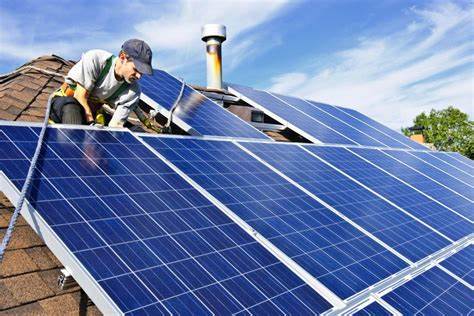Business
Homeowners Guide To Going Solar For Home: Know How To Get Panels Installed

Solar energy uses the sun’s rays to create electricity, making it a sustainable and renewable energy source. You may lessen your carbon impact and dependency on conventional fossil fuels by using the sun’s power. Photovoltaic (PV) panels, also referred to as solar panels, are able to convert sunlight into electrical power for use in your home. With advancements in technology, solar panels have become more efficient and affordable, making them an attractive option for homeowners.
-
The Benefits of Going Solar
There are numerous benefits to going solar for home. Firstly, it allows you to save money on your energy bills. By generating your own electricity, you can significantly reduce your monthly utility expenses. Additionally, solar energy is a clean and renewable source of power, which means that it has a minimal impact on the environment. By choosing solar for home, you are taking a step towards a greener and more sustainable future.
Another advantage of going solar is the potential for financial subsidies. Many governments and utility companies offer rebates, tax credits, and other subsidies to homeowners who install solar panels. These subsidies can help offset the initial cost of installation and make solar energy even more affordable.
-
Choosing the Right Solar Installation Company
Selecting the best installation firm is essential if you want solar panels placed in your home. A reputable and experienced company will ensure that your installation is done correctly and efficiently. Here are a few key factors to consider when selecting a solar installation company:
- Experience and Expertise: Look for a company that has a proven track record in the solar industry. Experience matters when it comes to installing solar panels, so choose a company with a solid reputation and a portfolio of successful installations.
- Certifications and Licenses: Ensure that the installation company has all the necessary certifications and licenses required by your state or India’s law. This ensures that they meet the required standards for installation and have the necessary knowledge and expertise.
- Quality of Equipment: The quality of the solar panels and other equipment used in the installation process is crucial for the long-term performance of your solar system. Choose a company that uses high-quality and reputable brands.
- Customer Reviews and Testimonials: Take the time to read customer reviews and testimonials to get an idea of the company’s reputation and customer satisfaction. Positive reviews indicate a reliable and trustworthy company.
- Warranty and Maintenance: Inquire about the warranty offered by the installation company. A good warranty ensures that you are protected in case of any issues with the system. Additionally, ask about their maintenance services and if they offer ongoing support for your solar system.
-
The Installation Process
Once you have chosen a solar installation company, the next step is the installation process itself. Here is a general overview of what you can expect during the installation:
- Site Assessment: The installation company will visit your home to assess the site and determine the best location for the solar panels. Factors such as roof orientation, shading, and available space will be considered during this assessment.
- Design and Permitting: The company will design a customized solar system based on your energy needs and the site assessment. They will also handle the necessary permits and paperwork required for the installation.
- Installation Day: On the installation day, the solar panels will be mounted on your roof or any other suitable location. The installers will connect the panels to your electrical system, ensuring that everything is properly wired and functioning.
- Inspection and Interconnection: After the installation is complete, a final inspection will be conducted to ensure that the system meets all the necessary safety and performance standards. Once approved, the system will be connected to the grid, allowing you to start generating solar energy.
-
Maintaining and Maximizing Solar Efficiency
- Regular cleaning and maintenance: Keep your solar panels clean and free from debris to maximize their efficiency. Regularly inspect for any damage or shading that may affect their performance. Consult your solar installation company for specific maintenance guidelines.
- Monitoring energy production: Install a solar for home monitoring system to track your energy production. This allows you to identify any issues promptly and optimize your energy usage.
- Maximizing solar efficiency: Consider energy-saving measures such as energy-efficient appliances, LED lighting, and insulation to further reduce your energy consumption and increase the efficiency of your solar system.
Conclusion
In conclusion, going solar for home is a wise and eco-friendly choice. By harnessing the power of the sun, you can reduce your carbon footprint, save money on your energy bills, and contribute to a sustainable future. Remember to choose a reputable solar installation company that meets your needs and preferences. With the right company and a well-designed solar system, you can enjoy the benefits of solar energy for years to come. So, take the leap and embrace the power of solar for your home!
-
Blog1 year ago
MyCSULB: Login to CSULB Student and Employee Portal – MyCSULB 2023
-
Android App3 years ago
Cqatest App What is It
-
Android1 year ago
What Is content://com.android.browser.home/ All About in 2023? Set Up content com android browser home
-
Software2 years ago
A Guide For Better Cybersecurity & Data Protection For Your Devices
-
Latest News2 years ago
Soap2day Similar Sites And Alternatives To Watch Free Movies
-
Android2 years ago
What is OMACP And How To Remove It? Easy Guide OMACP 2022
-
Android3 years ago
What is org.codeaurora.snapcam?
-
Business2 years ago
Know Your Business (KYB) Process – Critical Component For Partnerships



























